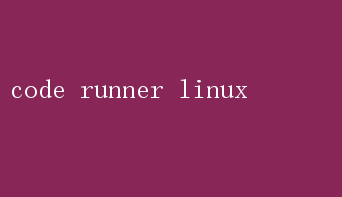Linux下Code Runner使用指南
code runner linux
作者:IIS7AI 时间:2025-01-02 23:13

Code Runner: Unleashing the Power of Linux for Software Development In the realm of software development, the choice of operating system can significantly influence productivity, efficiency, and the overall development experience. Among the myriad options available, Linux stands out as a formidable platform, particularly for those who prioritize performance, versatility, and a rich ecosystem of development tools. One cornerstone of this ecosystem is the concept of a code runner on Linux—a term that encapsulates the suite of tools, environments, and practices that enable developers to execute, test, and deploy their code with unparalleled ease and power. This article delves into the reasons why Linux is an ideal choice for code runners, exploring its key features, advantages, and how developers can leverage this powerful OS to enhance their coding workflow. The Linux Advantage: A Foundation for Productivity 1. Robust and Reliable Linuxs reputation for robustness and reliability is well-earned. Its Unix-like architecture ensures stability, making it an excellent choice for running critical development environments. This reliability extends to the countless hours saved from avoiding frequent crashes, system freezes, or software incompatibilities that can plague other operating systems. For code runners, this means fewer interruptions and more time focused on writing and refining code. 2. Performance Optimization Linuxs lightweight nature and efficient resource management make it an ideal OS for performance-intensive tasks. Whether youre compiling large codebases, running extensive simulations, or deploying complex web applications, Linux provides the necessary low-level control and optimization options to squeeze every ounce of performance out of your hardware. This is crucial for code runners who need to ensure their applications run smoothly under various conditions. 3. Open Source and Customizable Linuxs open-source nature fosters a culture of collaboration and innovation. The ability to inspect, modify, and distribute source code encourages transparency and trust. For developers, this means access to a plethora of free and open-source software(FOSS) tools, libraries, and frameworks. Moreover, Linuxs high degree of customizability allows code runners to tailor their development environments to their specific needs, creating a workspace that enhances productivity and creativity. The Code Runners Toolbox: Essential Linux Applications 1. Integrated Development Environments(IDEs) Linux boasts a rich selection of IDEs catering to various programming languages and frameworks. Popular choices include Visual Studio Code, JetBrains suite(IntelliJ IDEA, PyCharm,etc.), and Eclipse. These IDEs offer features such as syntax highlighting, code completion, debugging, version control integration, and extensive plugin ecosystems. On Linux, these tools often benefit from better performance and compatibility due to the OSs inherent support for Unix-like systems and extensive developer documentation. 2. Terminal and Shells The terminal is the command center for any Linux user, and its indispensable for code runners. Powerful shells like Bash, Zsh, and Fish provide a versatile interface for scripting, automation, and managing development tasks. With tools like`tmux`and `screen`, developers can maintain persistent sessions, multitask efficiently, and collaborate seamlessly over remote connections. 3. Version Control Systems (VCS) Git, the de facto standard for version control, is available natively on Linux and integrated into most IDEs and text editors. Linux users benefit from a robust set of Git clients and GUIs(such as GitKraken, SourceTree, and the official GitGUI) as well as extensive command-line functionality. This makes managing code repositories, collaborating on projects, and maintaining version history intuitive and efficient. 4. Build Tools and Compilers Linux is renowned for its support of a wide array of build tools and compilers. From GCC and Clang for C/C++ to Node.js for JavaScript, Rustup for Rust, and the JVM for Java, Linux ensures that developers have access to the latest versions of these essential tools. Package managerslike `apt`,`yum,dnf`,and `pacman` streamline the installation and management of these dependencies, ensuring a smooth development process. 5. Containers and Orchestration Linux is the backbone of containerization, thanks to Docker and its underlying technology, LXC(LinuxContainers). Containers provide a lightweight, isolated environment for running applications, making them ideal for development, testing, and deployment. Orchestration tools like Kubernetes further enhance container management, enabling scalable, resilient, and automated deployments. For code runners, this means the ability to create, test, and deploy applications in consistent, reproducible environments. Enhancing the Workflow: Linux Practices for Code Runners 1. Automation with Scripts Linuxs strong scripting capabilities, thanks to tools like Bash, Python, and Perl, empower code r
- 上一篇:Linux下用BMP格式写字教程
- 下一篇:Linux下打造高效终端指南